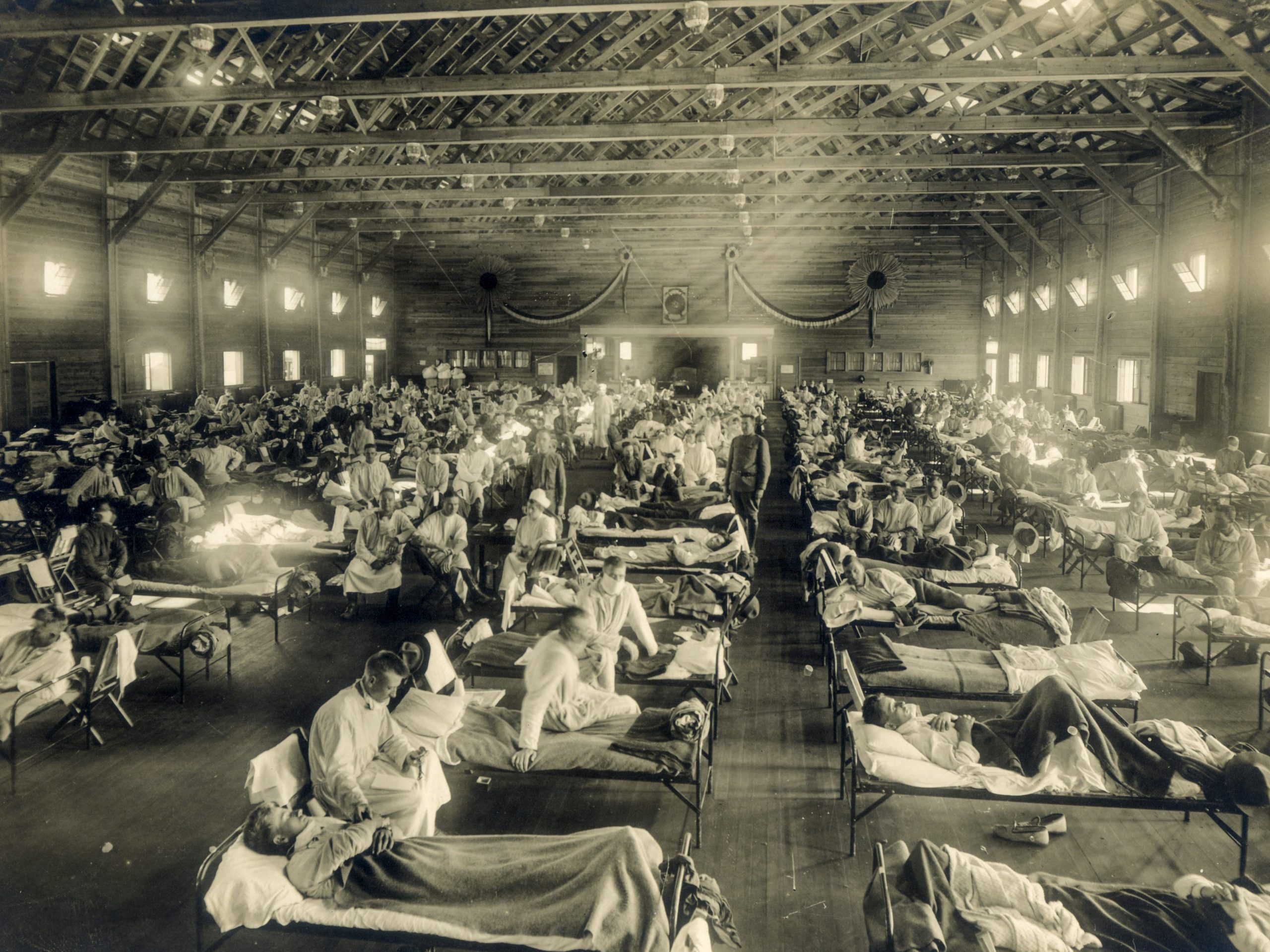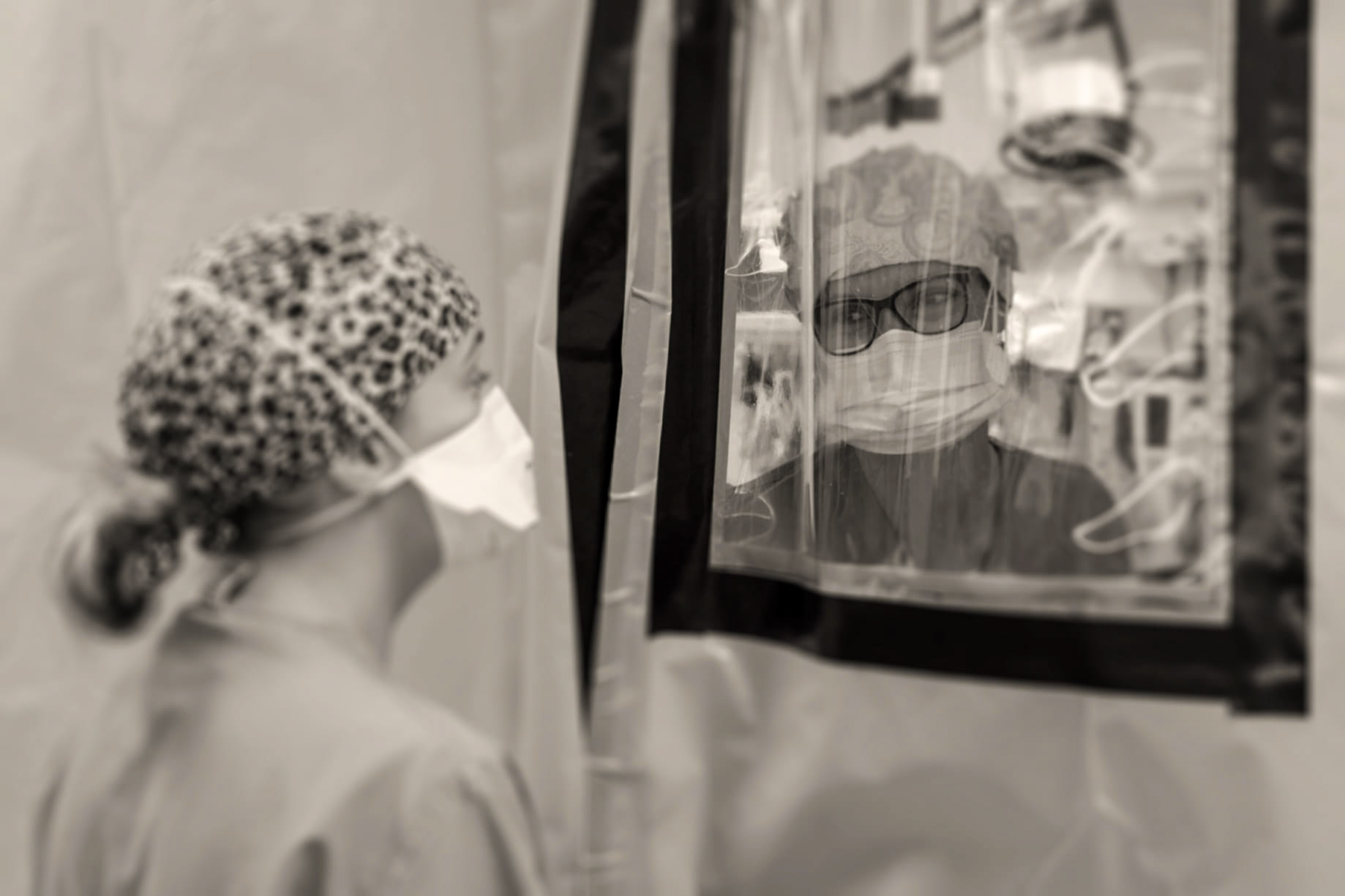Indianz.Com > News > Arne Vainio: Zoongide’iwin is the Ojibwe word for courage

Life has changed in the past year
Monday, March 29, 2021
Life has changed in the past year.
Last March my wife Ivy and I were on our way back from Los Angeles. Through luck and serendipity and the enduring goodness of people, my grandmother’s 1906 Singer treadle sewing machine found me and we were bringing it home. The radio was telling us of COVID-19 cases that were just starting in the United States and we were careful on that trip.
Shortly after we got home, COVID-19 began to spread and within weeks was spreading in Seattle, then in New York City and the death toll was climbing. The Navajo Nation was hit especially hard. Every day brought more and more deaths and stay at home mandates started. We started doing virtual and phone visits in the clinic and elective surgery in the hospitals was put off. The surgery floor in the hospital was dark and empty.
Restaurants closed and people were panic buying toilet paper and other supplies. It was impossible to find yeast or flour and the prices of those things skyrocketed. Personal protective equipment for health care workers suddenly became precious and there wasn’t enough of it. People started making masks and donating them to drives to be given away. Ivy was involved in mask giveaways for the NAACP and they gave away thousands of masks.
My grandmother’s sewing machine was new in 1906. She came from Finland and arrived in northern Minnesota in 1908. People made masks during the 1918 Influenza pandemic and it occurred to me her sewing machine was one of the few tools available that could really save lives. I thought of her as a young woman with her foot rocking the treadle and her hands guiding the fabric as she sewed. I spent days cleaning and oiling that ancient machine and getting it to sew again. There was a fifty year-old spool of thread still on the machine and it held just enough thread to make a mask for Ivy.
It took a while for COVID-19 tests to be developed and it could take as long as a week to get results back. Entire families had to quarantine and people had to stay home from work if they were exposed. Schools closed and people who could worked from home.
There were many who were unable to work remotely. Grocery store workers, service sector workers, custodial staff in hospitals and clinics and everyone involved in health care facilities that stayed open had to be at work.
The fear was palpable in the clinic. If a chest x-ray needed to be done, the x-ray room needed to be sanitized afterward. Lab staff still had to come in to the patient rooms to do blood draws if needed. We had a respiratory provider and a nurse assigned to a separate part of the clinic. Once they saw a patient with symptoms needing COVID-19 testing, they didn’t come in to the main part of the clinic for the rest of the day.
Rounding in the hospital was stressful. There was a screening station at the entrance and everyone had to go through it. One of the Intensive Care Units was reserved for COVID-19 patients only and full protective equipment was required to see patients. For some hospital patients, an air supplied respirator was used. That had a full hood and a filtered air supply pump. The noise of the fan and the hood made it difficult to hear lung and heart sounds and put a mechanical distance between caretakers and patients. Visitors were not allowed in the hospital and patients died without ever seeing their families. Zoongide’iwin is the Ojibwe word for courage. Zoongan means “it is strong, solid.” Ode means heart and the win on the end makes it a noun. Strength of heart is courage. Courage means doing the right thing, even when you are afraid. It’s easy to forget how uncertain the future seemed at the beginning of the pandemic. The COVID-19 vaccines have been a real game changer. Even though they have brought hope, we’re not out of the woods yet. I think back to a year ago. There was an entire household with multiple generations living together and they were too sick to come to the clinic for COVID-19 testing. Three of our nurses selflessly volunteered to go to them. They put on personal protective equipment and went in and tested everyone there. That single act of love and dedication will always define medicine for me. I remember rounding in the hospital and putting on all my personal protective equipment before seeing patients with known COVID-19 infections. My hands were red and cracked from washing them again and again before and after each patient contact. I could leave after I was done seeing patients. The nurses on the COVID-19 floor were there for the entire shift and often longer if other nurses were infected. The nurses in the COVID-19 ICU were with those critically ill patients constantly and there was no way to keep a distance from them. Nursing is a hands-on profession and always has been. There were no vaccines in the 1918 Influenza pandemic. There were no antibiotics and there were no valid medical treatments. Those that survived did so primarily because of good nursing care. Nurses put their patients before themselves and risked becoming infected to save others.Thank you to our #nurses in the #COVID19 ward at the Gallup Indian Medical Center in New Mexico, and those working across the IHS, for your continued dedication to our patients throughout #IndianCountry. #ThankYouNurses #NursesMonth #NativeHealth pic.twitter.com/5GGslNItbr
— IndianHealthService (@IHSgov) May 27, 2020

Arne Vainio, MD is an enrolled member of the Mille Lacs Band of Ojibwe and is a family practice physician on the Fond du Lac reservation in Cloquet, Minnesota. He can be contacted at a-vainio@hotmail.com.
Search
Filed Under
Tags
More Headlines
Native America Calling: A unique festival celebrates Indigenous literature and arts
Native America Calling: Treaties more than a century old provide both guidance and constraints
Native America Calling: Language revitalization: apps, games, and classroom lessons help keep Native languages vital
House Subcommittee on Oversight and Investigations holds hearing on cartels in Indian Country
Native America Calling: Tribal broadcasters scramble; Native higher ed leaders fight to keep funding
‘We’re frustrated’: Lawmakers press Indian affairs nominee on key issues
Cronkite News: Fires cause problems for Grand Canyon’s tourist economy
Press Release: Oklahoma City Indian Clinic receives health awards
AUDIO: Confirmation hearing for William “Billy” Kirkland to be Assistant Secretary for Indian Affairs
VIDEO: Confirmation hearing for William “Billy” Kirkland to be Assistant Secretary for Indian Affairs
NAFOA: 5 Things You Need to Know this Week (July 21, 2025)
Press Release: National Congress of American Indians continues to oppose racist imagery in sports
Chuck Hoskin: Cherokee Nation prepares for the future of public safety
Native America Calling: Tribes confront resource-intensive drive of Artificial Intelligence
Statement: Corporation for Public Broadcasting on elimination of federal funding
More Headlines
Native America Calling: Treaties more than a century old provide both guidance and constraints
Native America Calling: Language revitalization: apps, games, and classroom lessons help keep Native languages vital
House Subcommittee on Oversight and Investigations holds hearing on cartels in Indian Country
Native America Calling: Tribal broadcasters scramble; Native higher ed leaders fight to keep funding
‘We’re frustrated’: Lawmakers press Indian affairs nominee on key issues
Cronkite News: Fires cause problems for Grand Canyon’s tourist economy
Press Release: Oklahoma City Indian Clinic receives health awards
AUDIO: Confirmation hearing for William “Billy” Kirkland to be Assistant Secretary for Indian Affairs
VIDEO: Confirmation hearing for William “Billy” Kirkland to be Assistant Secretary for Indian Affairs
NAFOA: 5 Things You Need to Know this Week (July 21, 2025)
Press Release: National Congress of American Indians continues to oppose racist imagery in sports
Chuck Hoskin: Cherokee Nation prepares for the future of public safety
Native America Calling: Tribes confront resource-intensive drive of Artificial Intelligence
Statement: Corporation for Public Broadcasting on elimination of federal funding
More Headlines